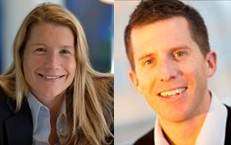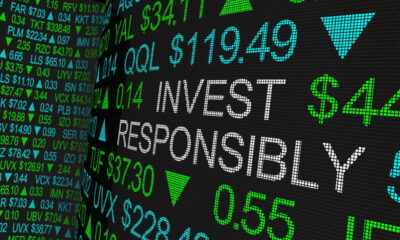

Features
‘There is no long term performance penalty for investing ethically’
Audrey Ryan and Ryan Smith, of investment managers Kames Capital, inform Alex Blackburne about the ins and outs of the company’s Ethical Equity Fund.
Blue & Green Tomorrow’s mantra is simple, ‘We want the world to be as blue and green tomorrow as it was yesterday’. Arguably the most effective way of achieving this entirely realistic dream is for everyone to invest in ethical funds.
Audrey Ryan and Ryan Smith, of investment managers Kames Capital, inform Alex Blackburne about the ins and outs of the company’s Ethical Equity Fund.
Blue & Green Tomorrow’s mantra is simple, ‘We want the world to be as blue and green tomorrow as it was yesterday’. Arguably the most effective way of achieving this entirely realistic dream is for everyone to invest in ethical funds.
Kames Capital’s Ethical Equity Fund, an Open-Ended Investment Company (OEIC), was one of the first investments to offer ethical criteria when it was founded in April 1989.
Under the company name of AEGON Asset Management UK, which it had worked under until relatively recently before changing to Kames Capital, the fund is negatively screened. This means it screens out companies based on various ‘negative’ activities, as opposed to screening in ones that have positive aspects.
“The criteria that we apply are quite diverse”, explains Ryan Smith, head of corporate governance at Kames Capital.
“They cover a range of traditional ethical screening factors that you would expect to see – alcohol, tobacco, weapons, human rights, pornography, and animal welfare.
“Those criteria have been set out to be as clear and explicit as we think that we can make them, so that advisers, IFAs and their clients can hopefully understand straight away the types of companies that the fund will and won’t invest in.”
Already, it’s clear that although Kames Capital’s fund is most certainly an ethical one, its philosophy is on the other side of the spectrum to our previous focus, WHEB AM’s Sustainability Fund, which actively seeks out investment in companies from three specific sectors.
“In terms of the ethos of the fund”, Smith continues, “It’s a traditional ethical fund that avoids investment in quite specific areas that ethical investors are generally interested in.
“It doesn’t have any positive remit, it doesn’t have a weighting towards renewables, and we’re not looking to change the world.
“It’s just a fund that is fairly traditional and screens out certain activities.”
The fund is rated ‘dark green’ because of its rigid investment guidelines. These kinds of funds are often considered the greenest kind of investments, because they are completely ruling out investment into any kind of unethical company.
The fund is benchmarked against the FTSE All-Share and the UK All Companies sector – “a standard against which the performance of a security, mutual fund or investment manager can be measured”, according to Investopedia.
Audrey Ryan, fund manager at Kames Capital since 1999, explains why they don’t benchmark the fund against the FTSE for good index.
“Given we’re about dark green screening funds, then actually the FTSE for good index is not that much more representative for us than the FTSE All-Share.
“When we’re speaking to investors, existing and potential, people understand what the FTSE All-Share benchmark is, and we can explain to them what our criteria are.
“For us, that’s the right thing to do.”
At the end of November this year, the fund was worth £236m. Its top long positions vary greatly; with the top ten including such companies as Vodafone, Prudential, BG Group, Tullow Oil and Aggreko.
“The starting point is to apply the ethical screen, and that creates an initial investable universe”, explains Smith, who also leads the socially responsible investment aspect of Kames Capital.
“That’s basically handed over to Audrey and her colleagues, and from that, they will create a portfolio which matches as closely as they can, the UK equity strategy.
“We don’t try to put a positive ethical spin on the companies that we invest in. The companies that are there are there because they don’t breach the ethical criteria.”
Fund manager Ryan adds to Smith’s comments, stating that the selection process and criteria that they had at Kames Capital was a winning formula.
“In terms of the investability of the fund, clearly there are certain sectors of the marketplace that we cannot invest in, but we have a proven track record of thinking outside the box.
“We’ve got a UK equity team of 12, and within that 12 we’ve got three individuals who specialise in looking at UK and small cap stocks, and that’s vital for managing the ethical equity fund, because once Ryan has done his screening, a large proportion of what the stocks that I can buy are in the small and mid cap space.”
The winning formula is proven by the fund’s performance over the last five years, as Ryan notes, before dispelling a common myth in the ethical investment field.
“In terms of cumulative performance”, she says, “the median fund has returned 5.91% and this fund has returned 8.12%, so it’s beaten the benchmark”.
“There is no long term performance penalty for investing ethically, based on our criteria and numbers. Having said that, you will get the odd year whereby it’s difficult for a fund like this to outperform against the market place.”
Ryan offered a final thought, or a prediction, to Blue & Green Tomorrow readers, about the near-term future of ethical funds.
“We think stock selection will be increasingly important looking into next year, because we do think we will see companies disappoint on earnings, so it’s very much focusing on the fundamental research that we can do as a house to identify stocks that we believe are going to outperform.
“I get slightly cautious in terms of outlook overall for next year, in the sense that we will all appreciate the fact that we will see fiscal tightening, not just in the UK and Europe, but also starting to take effect in the US as well.
“We do think it’s going to be a difficult environment.”
Difficult, maybe, but this difficultness is widespread across the whole economy, and certainly isn’t exclusive to ethical funds. Bearing this in mind, the most obvious choice if you want to help make a difference to the environment, is to choose to invest ethically.
Like Clare Brook before her, Ryan emphasised the point that ethical funds are a relatively long term commitment. Some people do manage to play a short term game, but if you really want to do your bit making the world as blue and green tomorrow as it was yesterday, then you’ll stick with it for the long run – not just for the planet’s gain, but for your own, too.
If you would like to know more about Kames Capital’s Ethical Equity Fund, visit their website. Otherwise, if you would like more information about investing ethically more generally, ask your financial adviser, if you have one, or complete our online form and we’ll connect you with a specialist ethical adviser.


 Features11 months ago
Features11 months agoEco-Friendly Cryptocurrencies: Sustainable Investment Choices

 Energy11 months ago
Energy11 months agoThe Growing Role of Solar Panels in Ireland’s Energy Future

 Energy10 months ago
Energy10 months agoGrowth of Solar Power in Dublin: A Sustainable Revolution

 Energy10 months ago
Energy10 months agoRenewable Energy Adoption Can Combat Climate Change




























